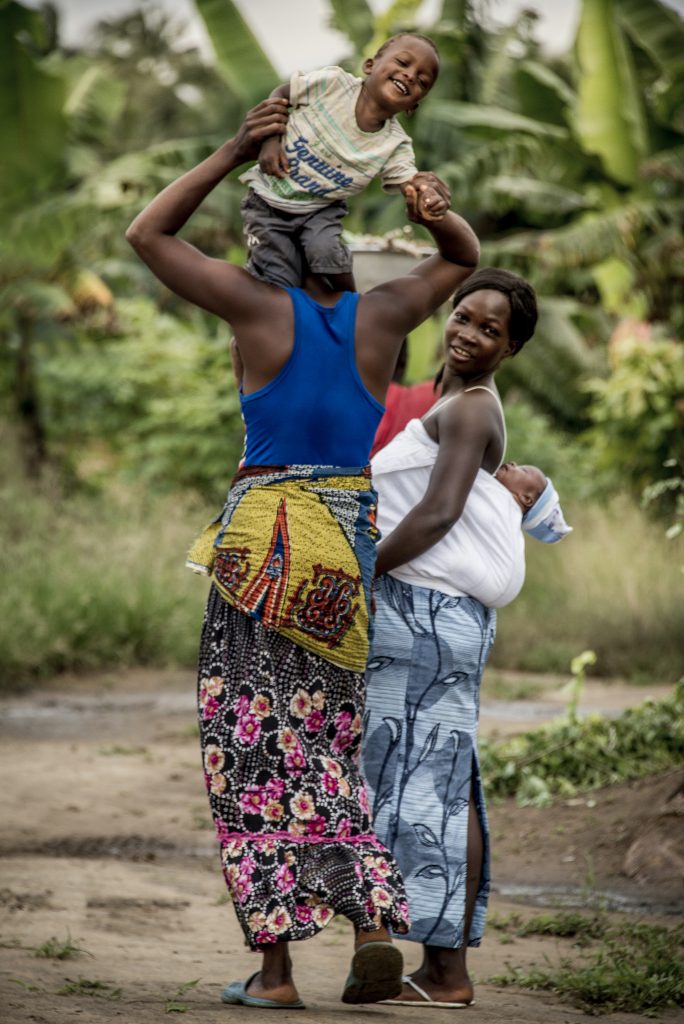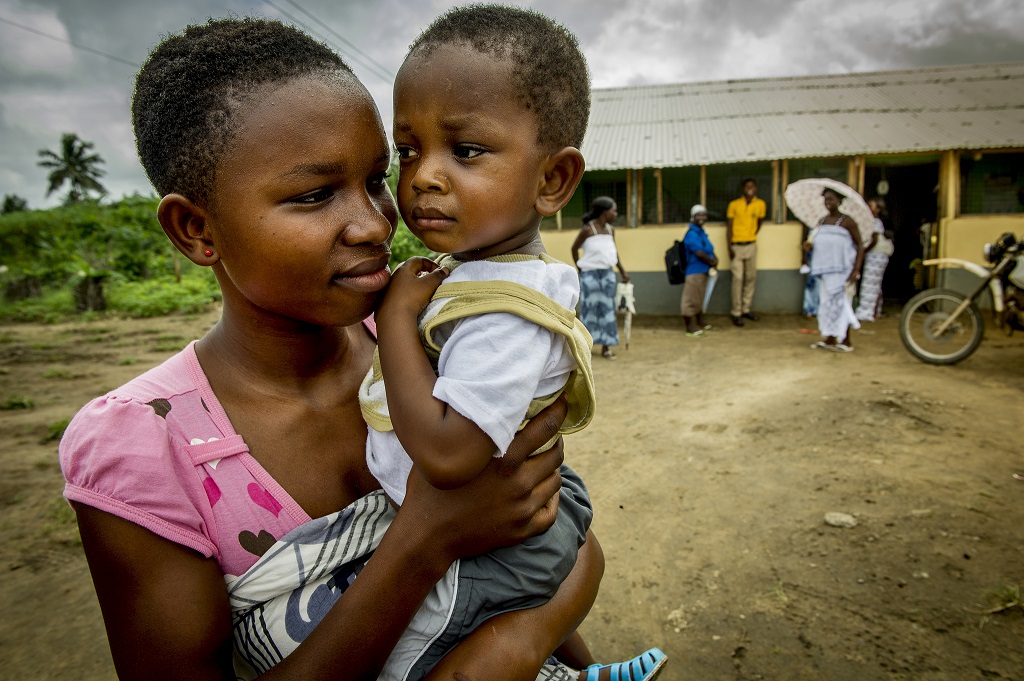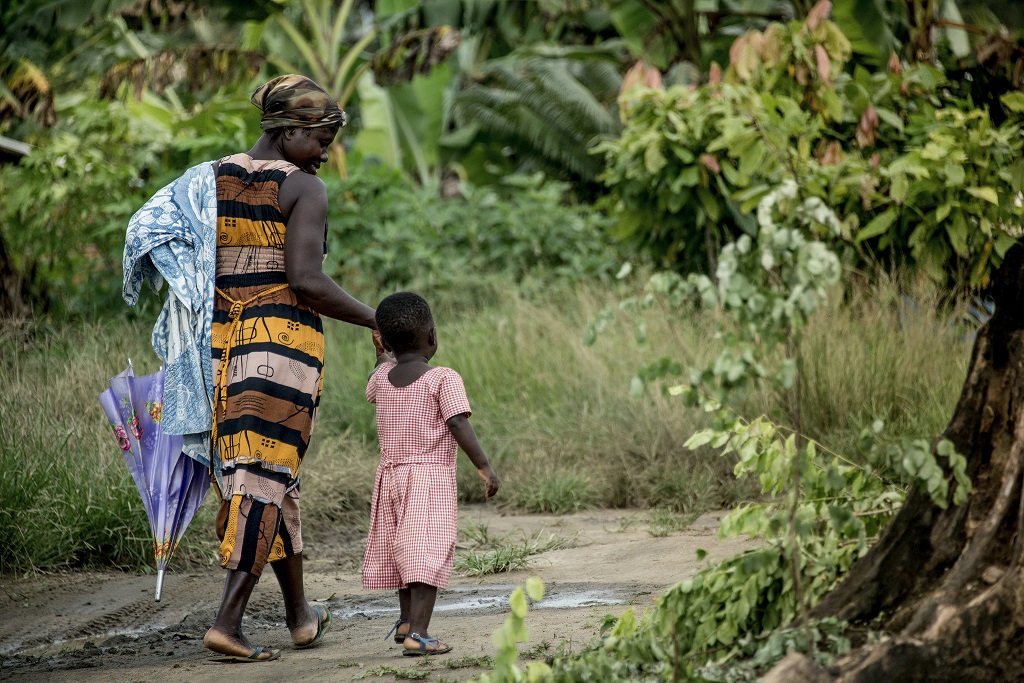Even in Celestina Asante’s earliest memories, her mother had a hot temper.
“Over the years, she would flare up, scream and beat me, and then I would usually go to bed crying,” she remembers. Well into adulthood – and becoming a mother of three herself – Asante still believed her mother’s parenting style was a good way to raise children.

But her perspective changed when she received early childhood development (ECD) training as Director of Health Services for the Kwahu West Municipality in the Eastern Region of Ghana. Asante is one of 721 Ghanaian health workers and administrators MCSP has trained in collaboration with the Municipality of Health Services to understand the impact of child development on the future of the country’s children.
“I wish I had participated in such a training earlier,” she says, as she now understands the impact of parents engaging positively with children, particularly in their formative years.
It is uncommon in Ghana to find parents playing or interacting much with their children. Yet extensive research shows that “nurturing, stimulating interaction between young children and their caregivers positively and permanently strengthens the ability to learn – and may even change brain function for life.” Conversely, lack of early stimulation can negatively influence a child’s cognitive, emotional and social development.
Globally, 43% of children (or 250 million) under five years of age living in low- and middle-income countries are at risk of not achieving their development potential. In Ghana, more than one-quarter of children aged 36-59 months are behind in the domains of language, cognitive, physical and socioemotional development. Compounding gaps in ECD, children in Ghana face significant nutritional deficiencies. Nearly 20% of children under-five are stunted, 5% are wasted, and 11% are underweight. Global research shows physical stunting is associated with cognitive stunting.
Based on this critical need, there is growing momentum for integrated ECD programming that engages multiple sectors – particularly health, nutrition, child and social protection, and education – to support parents in their caregiving function. However, many caregivers lack adequate knowledge on how to stimulate their children’s development.
In Ghana’s Eastern and Upper West regions, MCSP is working to counteract generations of poor health and low educational attainment by integrating ECD into existing health and nutrition activities. By addressing knowledge gaps about ECD during education sessions with mother-to-mother support groups and other critical points of contact, MCSP is preventing developmental delays and improving outcomes for children aged 0-3 years, a time period during which a child’s brain develops at a higher rate than any other time in life.
But how are we doing this, specifically?

MCSP’s ECD toolkit provides advice and game ideas that engage babies’ brains in new ways. This may mean building blocks, playing pretend, or recognizing colors. And while many of these lessons may seem standard or intuitive, in many cultures – including in Ghana – it is abnormal to speak with a baby before they can talk or actively engage.
To leverage frontline health workers to promote and practice early stimulation techniques at the community level, MCSP’s ECD trainings begin at the top and trickle down. We work with national and regional administrators from Ghana Health Services, Ministry of Gender and Children and other government agencies, who in turn train community health officers (CHOs). CHOs – who work at the community-based health planning and services (CHPS) compounds, where mothers and children receive routine services (such as antenatal and postnatal care, and nutrition) – then continue the step down training for community health volunteers (CHVs), who make visits to households and hold group sessions.
By integrating ECD material into the ongoing work of CHOs and CHVs, MCSP is helping to spread these messages far and wide. While they continue to discuss topics such as exclusive breastfeeding and nutrition with families of young children, CHOs/CHVs now also share information about early stimulation and activities. MCSP is also reaching new audiences through religious and child welfare groups, and creating linkages with the Ministry of Gender, Child, and Social Protection to make our materials and trainings available to social workers that see children at-risk in home visits and community group sessions.
“Initially, caregivers thought it was funny that health workers are concerned about how they play with their newborns, but now I think they are appreciating the true essence of ECD,” says Rosemary Kenieyel, a CHO from the Upper West Region trained by MCSP.

Joyce Tease, a CHO from the Eastern Region, was so impressed by the positive impact of the ECD training that she requested it be scaled-up nationwide, and went on – as part of the step-down training structure – to orient four of her colleagues on the key concepts and activities of ECD. Tease and her team are now firm believers in building community capacity for ECD.
Kenieyel, Tease and Asante are three of hundreds of Ghanaian health workers who have embraced ECD as part of their work. And their new belief in the importance of educating child caregivers on early stimulation and positive parenting is not just felt on the job, but in their homes, as well. Asante now encourages her own young children to play various educational games, she says, and when she interacts with them, she tries to do so with patience and tolerance.
ECD is a low-cost intervention to better health outcomes and sustainable development. MCSP is helping bring proven, cost effective solutions – many of which are based on the standard of care in countries like the US – to other countries that currently do not have access to them.
“Thanks to USAID,” Asante says, “we now know that optimizing the early years of our children’s lives is one of the best investment we can make in ensuring their future success.’’
In the two regions of Eastern and Upper West, MCSP has reached 266 CHPS compounds, 196 mother-to-mother support groups, and 911 communities with these messages. The Program is now taking an active role in institutionalizing this content by reviewing and influencing key government policy – including the National Newborn Strategy, National ECCD 0-3 Standards, and the Maternal and Child Health Booklet.

